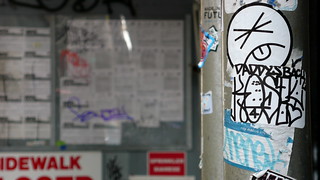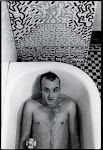
“It’s like a toothache having a toothache.”
“It’s not that bad, Tolya old man,” Peter said. He thrummed the chain of his pocket watch—hooked to his lapel, feeding into the lapel pocket of his black suit jacket.
“Mark my words,” Tolya said. “Revolution is coming to this country. I was born in Moscow. My mother taught me The Internationale before I was sucking on her teat!”
“Glad you didn’t try to do both at the same time,” Peter said.
Peter picked up a torn, sticky issue of Time Magazine from the pile of derelict rags and newssheets toppling off the table by the plastic row of chairs. Someone had torn away the front cover, depriving some figure of a moment of recognition, glory. All fleeting.
Tolya’s voice, Slavic in accent, echoed off the walls of the cramped private patient waiting room. He’d shed his accent years ago, but he put it on again the way professors wear thick glasses to disguise themselves as wise owls.
The staff ferried cancer patients back to the private waiting room, separating them from family or friends who accompanied them to their treatments, for those lucky enough to have company.
“The medical insurance in this country is shit. The People will not stand for it. Revolution is coming. I know this. It began in my country and will spread to all the people’s of the world.”
Peter flipped through the magazine.
“Your country buried Lenin and Stalin in a cheap plot and built a McDonalds on it.”
“Their spirit lives on,” Tolya said.
“Dreadful idea,” Peter said.
Nurse Wolfe poked in her head. Rosary beads dangled from her uniform pocket.
“Do you have to keep barking like that?” she said.
“The calm before the storm,” Peter said. The scar tissue swelled in his throat. His hand sought out the magic plastic bottle in his jacket pocket. “Don’t you know, Ms. Wolfe? Revolution is coming.”
“Da,” Tolya said. “We will storm the crystal-silver tower of Blue Cross, Blue Shield in Philadelphia. No more premiums. Insurance for all workers.”
“Fine,” she said. “Just keep it down, Comrade.”
Tolya winked at her. She fidgeted with the rosary.
“You’re up in a minute, Peter.”
She slipped out of the waiting room and merged back into her duties on the oncology floor. Her black-beaded rosary caught a chair edge. It yanked the beads from her pocket. They rolled to the floor. She didn’t notice.
Peter snapped open the morphine bottle and slipped out a little brown pill. He placed it on his tongue and grabbed his cup of cooled cappuccino—the only drink he could swallow passed the Berlin Wall in his throat. He gulped down the pill. Now, he waited for relief.
He always waited.
“She is one of the faithful,” Tolya said.
“If she grew a beard, I’d swear she was Trotsky.”
Peter eased out of the chair, careful on his weak legs. He’d lost a third of his body weight since chemo. The world rocked beneath his step, gravity tugging at him the way love pulls from a ruptured heart when you’re trying to forget her violet eyes. He scooped up the rosary and slipped it into his lapel pocket, tangling it in the folds of his watch chain.
“You mock me, Peter, after we name our great city after you. Petrograd.”
“No Tolya,” Peter said. “I love you, my angel.”
Tolya frowned, swallowing a bellyful of revolution. He didn’t mean it. He just didn’t know how to smile.
Nurse Wolfe returned and beckoned Peter. She led him down the ward, under the jaundiced halogen lights. Linear Accelerate Room Two sucked him in.
Peter disrobed. He hung his jacket on the wall. He unbuttoned his shirt. The freezing air chilled him. He slipped off his trousers. The tech wobbled out.
“You know the drill,” she muttered, not looking at him with her vapid eyes.
He eased his body down on the stainless steel table—a brown leaf on the pavement with anon wind blowing.
He shivered, laying on a glacier. The cold metal fused to his flesh. The tech carried out the wax bite. She screwed it to the table and hung the metal arm over his mouth. Following the routine of the last two months, he lifted his head and fit his mouth, his teeth into the grooves of the wax tongue. The dead frog slithered in his mouth. The tech taped his head to the table then rolled him below the square face of the linear accelerator.
The old beast groaned, igniting to life. The arm trembled and complained. It rotated to position, lining its crimson lasers to the black dot tattoos on Peter’s skin. He held his breath.
Stay very still.
The beast inhaled then growled. Ozone gagged him, the metallic air forcing down his throat. It burned him with invisible beams, the secret cosmic forces that compelled the universe.
When this battle finally ended, when the lymphoma had been washed away, burned into charred meat, he’d get a new tattoo. Doctor Helsinki forbade it. A tattoo would obscure target areas in case he needed treatment if the lymphoma called again. It only compelled him to get his chest stained.
He’d get an animal. It would paw his chest, warm his heart. It would guard him against night spirits, old ghosts of the dead that refused to release. He’d never be alone.
He pondered it. The machine spit its poison then ceased. The tech released him. He dressed. The rosary rattled in his lapel pocket. He strolled out of the room and by the nurse’s desk.
“Ms. Wolfe.”
She peered up with soggy eyes from her chart. Daffodils etiolated in a parched vase on the desk. The dusty petals fell in front of her face.
“You dropped your key to heaven,” Peter said.
Peter pulled free the rosary from his pocket. It yanked on the watch chain, but he parted the two serpents. He dangled the necklace in front of her. Her eyes bloomed.
“God Peter,” she said. “Can’t fathom I lost it. My mother gave it to me before she died. I carry them with me everyday, always, for thirteen years since thrombosis took her. God bless her. And you.”
He winked.
She jumped up from the desk and came round. She pursed her lips and reached to kiss him. She paused and lingered, hovering at the edge of his cheek. Then, she rubbed his shoulder. He tipped his head.
“At your service.”
Passing the private waiting room, he stuck his head in and said to Tolya, “The three-thirty Magic Bullet to Moscow, Heaven and all points beyond now boarding.”
“Crazy man,” Tolya said. “Revolution is coming. You remember I said it.”
Peter waved and strolled out of the ward, taking his time, keeping his footing. He exited via the E.R. doors onto South Street. He crossed the street, pushing through the line of yellow cabs parked in front of the Penn Tower’s Hotel. He planned to grab a fresh cappuccino then take a cab to the 30th Street Station.
Gazing out from a hawthorn bush, a brown fox watched the city. It studied the odd human machines as they flew by—such funny animals, humans, always seeking to fill a hole then digging more. It wrinkled its nose. Peter recognized its perplexed visage. He related. Peter wrinkled his nose, joining the fox.
“I think . . . maybe.”
The fox darted around the curved building of the hotel.
“A fox then,” Peter said to himself. “Key to heaven.”
T. Fox Dunham resides outside of Philadelphia PA—author and historian. He’s published in over 130 international journals and anthologies and writes for Team Obama. He’s a cancer survivor. The story is based on his experiences battling cancer, and the characters can be found in other stories. His friends call him fox, being his totem animal, and his motto is: Wrecking civilization one story at a time.
Street art by Kosby.
Photo by Adam Lawrence.
Seatraffic is a San Francisco based duo releasing a new ep on August 1st which features the track "Put Away."

No comments:
Post a Comment